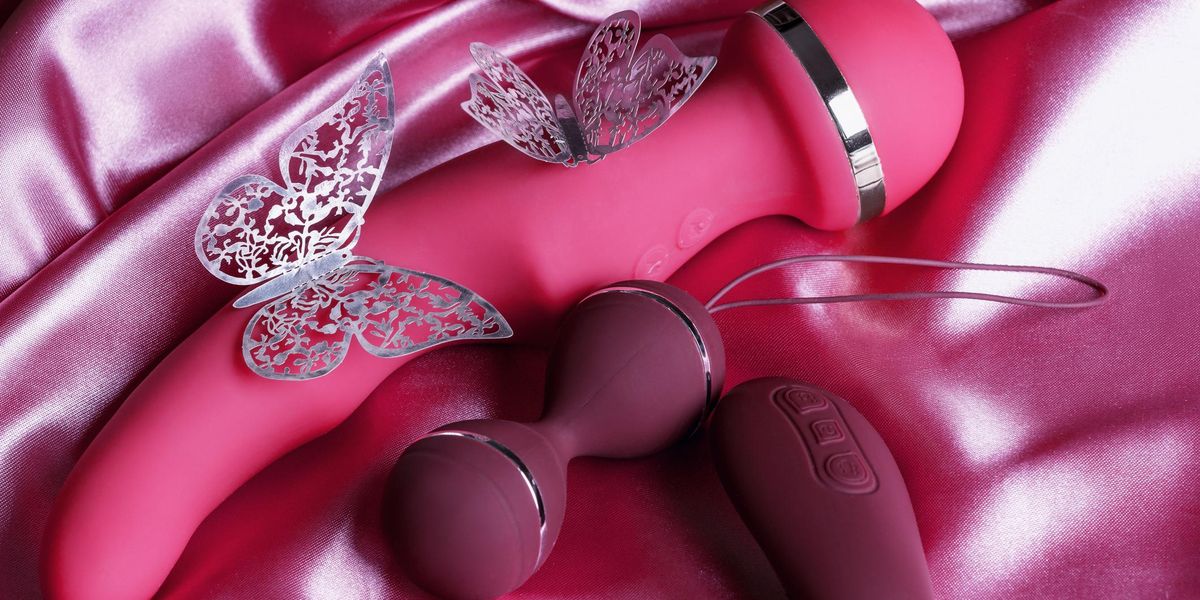
Brace Yourself: There Are Potential Cons of Using a Vibrator
Recently, I watched a YouTube video that was so ridiculous (to me, anyway) that I'm not gonna even link y'all to it. The gist was it featured a woman who was going on and on about us not needing men anymore because we've got technology. When another woman refuted her point by bringing up the fact that it takes both men and women to keep humanity going, I thought about a woman in my own world who is currently so fed up with guys that she's now named her vibrator, claiming that is the only "man" she needs. Chile.
True confession here — I have never used a vibrator before. Even when I used to be a big-time masturbator, there was no electronic device that helped me along my merry way. Still, it's not like I don't get that there aren't some pluses when it comes to those who choose to have one — or seven or 10 of them. I mean, anything that can give you an orgasm can help to relieve stress. With a vibrator, you don't have to worry about getting an STI/STD (unless you're sharing it with them) or pregnant from one. And if you struggle with climaxing during intercourse, a vibrator can help you to figure out why and/or it can deliver to you what you can't seem to (at least currently get) any other way. Check. Check. And check.
Still, if you read enough of my content, you already know that I'm all about balance and also making sure that you are clear on the motives behind why you do what you do. So, if you happen to be like the woman that I know who thinks that vibrators don't have a potential "downside" like just about everything else in life, I just want to take out a couple of minutes to offer you some things to think about.
It Could Lead to Clitoral Discomfort
According to one study that I checked out, around 53 percent of women admitted to using a vibrator (personally, I think it's significantly higher than that). Many of them said that they used theirs at least four times a month with 71 percent of them saying that they didn't experience any side effects. Glad to hear it. Still, something to keep in mind is, if you're using your vibrator constantly, it could lead to some level of clitoral discomfort over time. How in the world can that happen? If you're continually giving your clitoris direct stimulation, the discomfort could come from the vibration stimuli that never really lets up.
Is there a "hack" for this? One of the main things to keep in mind is that you should use lube with your vibrator (that will significantly decrease the chances of any minor "rub burns" from happening) and that you try and avoid always applying direct pressure to your clitoris with your vibrator as much as possible.
It Could Give/Spread an Infection
If you're the only one who is using your vibrator, how in the world can it give you or spread an infection throughout your body? Well, bodily fluids are just that and if you're using your vibrator without thoroughly cleaning it after each and every use, that could cause bad bacteria to "double up" and give you some sort of infection. Or, say that you like to penetrate your vagina and your anus. Remember how we were instructed to wipe from front to back while growing up? If you're not applying this similar take on the sexual tip, you could give or spread an infection throughout your system that way too.
This is why it's so important to use a vibrator that's made of nonporous materials such as silicone or glass; that you use a washcloth, an antibacterial soap, and warm water to clean your vibrator, and that you store it in a box or pouch, so that dust and debris doesn't get onto it.
It Could Cost You a Couple of “Orgasm Phases”
You've probably heard that there are several phases/stages to having an orgasm before. Well, while some sex and wellness experts believe that there are eight of them (climax, resolution, restoration, turn-on, peaking, excitement, plateau and stillness) most say that there are only four — desire, arousal/plateau, orgasm and resolution. Desire is what happens when you're in the process of getting excited about getting turned on. Arousal/plateau is your body's response to sexual stimulation that helps to bring you to an orgasmic state (such as foreplay, oral sex and intercourse). Orgasm is your climax. Resolution is what happens when your orgasm is completed, you start to come down from your "high" and satisfaction (and oftentimes fatigue) transpire.
Well, here's the thing about a vibrator. Once you get a handle on how to make it work for you, oftentimes you jump right to the orgasm while basically bypassing desire and arousal. While you might be reading this and thinking "OK…and?", the point here is you deserve to experience all stages including being turned on and the true pleasure that comes from foreplay, oral sex, etc. Besides, there are things that happen during those phases that oftentimes don't get talked about, nearly enough. This brings me to the next point.
It Could Cause You to Miss Out on Hits of Nitric Oxide and Oxytocin
A colorless gas and essential molecule that your body needs is nitric oxide. A natural hormone and chemical messenger that's in your system is oxytocin. Nitric oxide is essential because it can improve your blood pressure, decrease muscle soreness, strengthen your heart, help to manage type 2 diabetes and keep your blood vessels nice and healthy. Oxytocin gets discussed quite a bit over this way because, not only does it help partners to bond during sex, it also reduces stress, promotes physical healing, cultivates emotion-related memories, increases sexual arousal and encourages sound sleep.
Thing is, when you constantly opt for a vibrator over a human being, it could cause you to skip right over the arousal phase which is how both of these things are substantially triggered. So, you could be missing out on some of the chemical and hormonal benefits that sex with an actual person is able to provide you that sex with a vibrator does not.
It Could Negatively Affect Your Communication with Your Partner
One of the challenges that I have with some of the clients that I work with is when they are mad at their husband, they decide to "take it out on their vibrator". Since all they seem to be concerned with is spiting their man (by not giving him any) and getting the stress out from being pissed, they can end up, oftentimes without even noticing it, becoming addicted to this approach. This prevents them from fully talking things through with their partner, so that a healthy sexual (and emotional) connection can resume. Another challenge is when a newly-married woman has been so used to relying on her vibrator (and/or faking orgasms with her partner) gets married and realizes the responsibility that comes with marital sex (meaning, it's not just something that you should do randomly; it needs to be seen as a staple in the union), she doesn't really know how to effectively communicate with her partner what she needs in order to be (or remain) sexually fulfilled.
Yep. That's another challenge that comes to totally relying on a vibrator for sexual satisfaction — it can have you internalizing your needs while taking on the mindset, "Screw him. Where's my vibrator at?" and when you're in a serious long-term relationship…yeah, that's not good.
Patterns are patterns and vibrators can put you into one like anything else. That said, if all you're really concerned with is getting off and nothing else, once you do have sex with a human being, you could find yourself so caught up in immediate gratification that you don't know how to enjoy everything that leads up to climaxing or even all of the pleasure that can come after it (check out "Sure, Your Foreplay Game Is On Point. Now What About The 'Afterplay'?"). It can have you so self-consumed and even selfish that you end up being impatient with and perhaps unrealistic about what it means to engage another individual.
As you can see, everything has a flip side to its coin. A vibrator has pros and potential cons, if you're not careful. So, before you push play on Whitney Houston's "All the Man That I Need" as you get your vibrator out of its box, reflect on what I just said. A vibrator can be a source of pleasure yet it shouldn't be treated like a replacement for sex with an actual person. Because let's be real — there isn't one.
Join our xoTribe, an exclusive community dedicated to YOU and your stories and all things xoNecole. Be a part of a growing community of women from all over the world who come together to uplift, inspire, and inform each other on all things related to the glow up.
Featured image by Getty Images
Different puzzle pieces are creating bigger pictures these days. 2024 will mark a milestone on a few different levels, including the release of my third book next June (yay!).
I am also a Professional Certified Coach. My main mission for attaining that particular goal is to use my formal credentials to help people navigate through the sometimes tumultuous waters, both on and offline, when it comes to information about marriage, sex and relationships that is oftentimes misinformation (because "coach" is a word that gets thrown around a lot, oftentimes quite poorly).
I am also still super devoted to helping to bring life into this world as a doula, marriage life coaching will always be my first love (next to writing, of course), a platform that advocates for good Black men is currently in the works and my keystrokes continue to be devoted to HEALTHY over HAPPY in the areas of holistic intimacy, spiritual evolution, purpose manifestation and self-love...because maturity teaches that it's impossible to be happy all of the time when it comes to reaching goals yet healthy is a choice that can be made on a daily basis (amen?).
If you have any PERSONAL QUESTIONS (please do not contact me with any story pitches; that is an *editorial* need), feel free to reach out at missnosipho@gmail.com. A sistah will certainly do what she can. ;)
ItGirl 100 Honors Black Women Who Create Culture & Put On For Their Cities
As they say, create the change you want to see in this world, besties. That’s why xoNecole linked up with Hyundai for the inaugural ItGirl 100 List, a celebration of 100 Genzennial women who aren’t afraid to pull up their own seats to the table. Across regions and industries, these women embody the essence of discovering self-value through purpose, honey! They're fierce, they’re ultra-creative, and we know they make their cities proud.
VIEW THE FULL ITGIRL 100 LIST HERE.
Don’t forget to also check out the ItGirl Directory, featuring 50 Black-woman-owned marketing and branding agencies, photographers and videographers, publicists, and more.
THE ITGIRL MEMO

I. An ItGirl puts on for her city and masters her self-worth through purpose.
II. An ItGirl celebrates all the things that make her unique.
III. An ItGirl empowers others to become the best versions of themselves.
IV. An ItGirl leads by example, inspiring others through her actions and integrity.
V. An ItGirl paves the way for authenticity and diversity in all aspects of life.
VI. An ItGirl uses the power of her voice to advocate for positive change in the world.
Let’s make things inbox official! Sign up for the xoNecole newsletter for daily love, wellness, career, and exclusive content delivered straight to your inbox.
When discussing the topic of raising children, discipline is often the first thing that comes to mind. Children need discipline. Full stop. But what is discipline? And how do we draw the line between discipline and revenge?
The origin of the word "discipline" can be traced back to the Latin word "disciplina," which means "instruction" or "teaching." Over time, however, discipline has come to be synonymous with punishment, with parents relying on shame, fear, and/or physical pain to curb undesirable behavior.
Teaching takes time, so nipping it in the bud in whatever fashion parents deem necessary (within reason) has become the norm. But is this what’s best for children? And when does it become less about curbing undesirable behavior and more about getting our licks back for offenses we feel our children should know better to do?
In my work as a parenting coach, I’ve often heard parents say, “I asked him nicely three times before spanking him. He didn’t stop doing it until I did, so clearly talking doesn’t work.”
And the parent isn’t wrong. Talking often doesn’t work the first, the third, or the even the 10th time. And the reason is directly tied to brain development.
Children cannot and do not process information the way an adult can. Auditory processing is not fully developed until a child is 14 or 15 years old. And even then, if a child has auditory processing delays or Auditory Processing Disorder (APD), they may always struggle with processing auditory commands. According to Susie S. Loraine, MA, CCC-SLP, the term auditory processing refers to how the brain perceives and interprets sound information. Several skills determine auditory processing ability—or listening success. They develop in a general four-step hierarchy, but all work together and are essential for daily listening.
Without this understanding, discipline can easily become revenge because parents will then view their child’s misdeeds as a personal slight. Instead of teaching them to do better, parents now want to show them the consequences of not doing better. This is why it's imperative for parents to discern between discipline and revenge to maintain healthy relationships with their children.
5 WAYS TO DISTINGUISH BETWEEN PARENTAL GUIDANCE AND RETALIATION:
Understanding The Intent
Discipline is rooted in love and concern for the child's well-being. It focuses on teaching lessons and helping children understand the consequences of their actions. Conversely, revenge-driven actions stem from a desire to inflict pain or punishment as payback for perceived slights or disobedience. Parents should reflect on their motives before taking disciplinary actions. Ask yourself whether your intention is to help your child learn or to make them suffer for upsetting you.
Example: If a child accidentally breaks a valuable item, a disciplinary response would involve discussing the importance of being careful and working with the child to come up with a way to replace or fix what they’ve broken. On the other hand, a vengeful reaction might involve yelling, harsh punishment, or bringing up past mistakes to intensify guilt.
Maintaining Emotional Regulation
Effective discipline requires parents to remain calm and composed, even in challenging situations. It's natural to feel upset or frustrated when children misbehave, but responding with anger or resentment can escalate the situation and blur the line between discipline and revenge. Before addressing the issue, take a moment to breathe and collect your thoughts.
Example: If a child cannot follow instructions, a disciplined response would involve calmly explaining why their cooperation is necessary in working with the child to accomplish the goal. Conversely, a retaliatory response might involve shouting, name-calling, or resorting to physical punishment out of anger.
Promoting Growth and Learning
Discipline should always aim to promote growth and learning. It involves guiding children toward making better choices and understanding the impact of their actions on themselves and others. Effective discipline strategies include positive reinforcement, setting clear expectations, and providing opportunities for reflection and growth.
Example: If a child repeatedly forgets to complete their chores, a disciplinary approach would involve discussing the importance of responsibility and finding solutions together, such as creating a chore chart or setting reminders with Siri or Alexa. In contrast, a revenge-driven response might involve imposing overly harsh punishments or belittling the child, which can undermine their self-esteem and hinder their ability to learn from their mistakes.

Momo Productions/Getty
Building Trust and Communication
Trust and open communication are essential components of a healthy parent-child relationship. Discipline should strengthen this bond by fostering trust and encouraging children to confide in their parents without fear of judgment or retaliation. When children feel safe and supported, they're more likely to accept discipline as a form of guidance rather than punishment.
Example: If a child admits to breaking a rule or making a mistake, a disciplined response would involve listening to their perspective, discussing the consequences of their actions, and working together to find a solution. Conversely, a retaliatory response might involve accusations, blame, or shutting down communication, which can erode trust and damage the parent-child relationship.
Seeking Professional Guidance
Parenting is a learning journey, and, disciplining children is a delicate balance between guiding them toward responsible behavior and nurturing their growth. By understanding the intent behind our actions, maintaining emotional regulation, promoting growth and learning, building trust and communication, and seeking professional guidance when needed, as parents we can help our children built on love, respect, and understanding.
Let’s make things inbox official! Sign up for the xoNecole newsletter for love, wellness, career, and exclusive content delivered straight to your inbox.
Featured image by Courtney Hale/Getty Images









